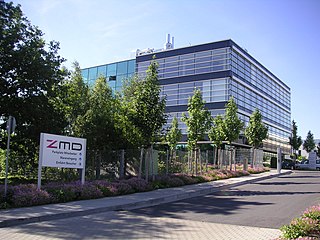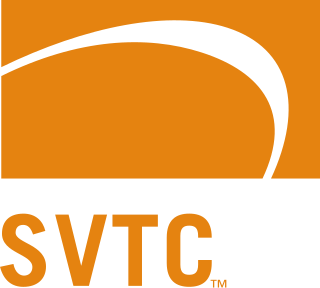
Semiconductor device fabrication is the process used to manufacture semiconductor devices, typically integrated circuits (ICs) such as microprocessors, microcontrollers, and memories. It is a multiple-step photolithographic and physico-chemical process during which electronic circuits are gradually created on a wafer, typically made of pure single-crystal semiconducting material. Silicon is almost always used, but various compound semiconductors are used for specialized applications.

STMicroelectronics NV is a European multinational semiconductor contract manufacturing and design company. It is the largest of such companies in Europe. It was founded in 1987 from the merger of two state-owned semiconductor corporations: Thomson Semiconducteurs of France and SGS Microelettronica of Italy. The company is incorporated in the Netherlands and headquartered in Plan-les-Ouates, Switzerland. Its shares are traded on Euronext Paris, the Borsa Italiana and the New York Stock Exchange.

Taiwan Semiconductor Manufacturing Company Limited is a Taiwanese multinational semiconductor contract manufacturing and design company. It is the world's most valuable semiconductor company, the world's largest dedicated independent ("pure-play") semiconductor foundry, and Taiwan's largest company, with headquarters and main operations located in the Hsinchu Science Park in Hsinchu, Taiwan. Although the central government of Taiwan is the largest individual shareholder, the majority of TSMC is owned by foreign investors. In 2023, the company was ranked 44th in the Forbes Global 2000. Taiwan's exports of integrated circuits amounted to $184 billion in 2022, accounted for nearly 25 percent of Taiwan's GDP. TSMC constitutes about 30 percent of the Taiwan Stock Exchange's main index.
In semiconductor manufacturing, silicon on insulator (SOI) technology is fabrication of silicon semiconductor devices in a layered silicon–insulator–silicon substrate, to reduce parasitic capacitance within the device, thereby improving performance. SOI-based devices differ from conventional silicon-built devices in that the silicon junction is above an electrical insulator, typically silicon dioxide or sapphire. The choice of insulator depends largely on intended application, with sapphire being used for high-performance radio frequency (RF) and radiation-sensitive applications, and silicon dioxide for diminished short-channel effects in other microelectronics devices. The insulating layer and topmost silicon layer also vary widely with application.
The 90 nm process refers to the technology used in semiconductor manufacturing to create integrated circuits with a minimum feature size of 90 nanometers. It was an advancement over the previous 130 nm process. Eventually, it was succeeded by smaller process nodes, such as the 65 nm, 45 nm, and 32 nm processes.
ams OSRAM AG is an Austrian semiconductor manufacturer headquartered in Premstätten, Austria with a co-headquarters in Munich, Germany. The company develops and produces intelligent sensors and emitter components

Zentrum Mikroelektronik Dresden (ZMD) was regarded as the heart of East Germany's microelectronics research in the 1980s as well as its most advanced integrated circuit manufacturer. Together with TU Dresden and VEB Spurenmetalle Freiberg, ZMD formed the foundation for Silicon Saxony, a cluster of microelectronics companies that came to include new fabs by Siemens and AMD.

The U880 is an 8-bit microprocessor that was manufactured by VEB Mikroelektronik "Karl Marx" Erfurt in the German Democratic Republic. Production of the U880 started in 1980 at VEB Funkwerk Erfurt. The U880 is an unlicensed clone of the Zilog Z80 microprocessor, also supporting illegal opcodes and bugs, except for very minor differences like not setting the CY flag for the OUTI command.
Soitec is an international company based in France, that manufactures substrates used in the creation of semiconductors.
The term die shrink refers to the scaling of metal–oxide–semiconductor (MOS) devices. The act of shrinking a die creates a somewhat identical circuit using a more advanced fabrication process, usually involving an advance of lithographic nodes. This reduces overall costs for a chip company, as the absence of major architectural changes to the processor lowers research and development costs while at the same time allowing more processor dies to be manufactured on the same piece of silicon wafer, resulting in less cost per product sold.

The Ferdinand-Braun-Institut, Leibniz-Institut für Höchstfrequenztechnik (FBH) is a research institute, which is a member of the Gottfried Wilhelm Leibniz Scientific Community. The institute is located in Berlin at the Wissenschafts- und Wirtschaftsstandort Adlershof (WISTA), its research activity is applied science in the fields of III-V electronics, photonics, integrated quantum technology and III-V technology
GlobalFoundries Inc. is a multinational semiconductor contract manufacturing and design company incorporated in the Cayman Islands and headquartered in Malta, New York. Created by the divestiture of the manufacturing arm of AMD, the company was privately owned by Mubadala Investment Company, a sovereign wealth fund of the United Arab Emirates, until an initial public offering (IPO) in October 2021.

Vanguard International Semiconductor Corporation (VIS) is a Taiwanese specialized IC foundry service provider, founded in December 1994 in Hsinchu Science Park by Morris Chang. In March 1998, VIS became a listed company on the Taiwan Over-The-Counter Stock Exchange (OTC) with the main shareholders TSMC, National Development Fund, Executive Yuan and other institutional investors.

SVTC Technologies was a technology services company that provided development and commercialization services for semiconductor process-based technologies and products. SVTC operated from 2004 to October 2012.

Tower Semiconductor Ltd. is an Israeli company that manufactures integrated circuits using specialty process technologies, including SiGe, BiCMOS, Silicon Photonics, SOI, mixed-signal and RFCMOS, CMOS image sensors, non-imaging sensors, power management (BCD), and non-volatile memory (NVM) as well as MEMS capabilities. Tower Semiconductor also owns 51% of TPSCo, an enterprise with Nuvoton Technology Corporation Japan (NTCJ).

VEB Kombinat Mikroelektronik Erfurt was an important manufacturer of active electronic components in East Germany. It should not be confused with the more well-known VEB Kombinat Robotron Dresden which used integrated circuits from Kombinat Mikroelektronik in its computers.

VEB Halbleiterwerk Frankfurt (Oder) (abbreviated HFO or HWF) was the largest manufacturer of semiconductor devices in the German Democratic Republic. In 1989, HFO produced 110 million integrated circuits (70% of all integrated circuits produced in the GDR in that year), 9.7 million transistors, and 150 million transistor chips. Despite this, HFO did not rise to prominence like Zentrum Mikroelektronik Dresden (of megabit chip fame) or VEB Mikroelektronik "Karl Marx" Erfurt (known for its microprocessors). Also unlike Zentrum Mikroelektronik Dresden and VEB Mikroelektronik "Karl Marx" Erfurt, HFO did not survive long after German Reunification.
Weebit Nano is a public semiconductor IP company founded in Israel in 2015 and headquartered in Hod HaSharon, Israel. The company develops Resistive Random-Access Memory technologies. Resistive Random-Access Memory is a specialized form of non-volatile memory (NVM) for the semiconductor industry. The company's products are targeted at a broad range of NVM markets where persistence, performance, and endurance are all required. ReRAM technology can be integrated in electronic devices like wearables, Internet of Things (IoT) endpoints, smartphones, robotics, autonomous vehicles, and 5G cellular communications, among other products. Weebit Nano's IP can be licensed to semiconductor companies and semiconductor fabs.

Sama Jaya Free Industrial Zone is a high tech industrial zone located in Kuching, Sarawak, Malaysia.












